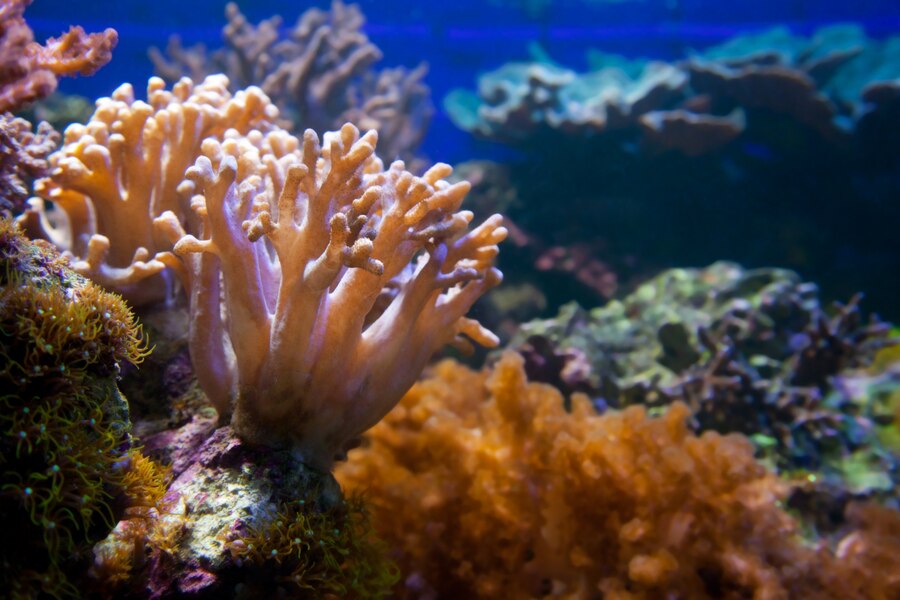
Conserving coral reefs: Why it matters?
Coral reefs, often called the “rainforests of the sea,” are among the most diverse ecosystems on Earth. Occupying less than 1% of the ocean floor, they support approximately 25% of all marine species, including fish, crustaceans, and mollusks. These vibrant underwater ecosystems are not only visually stunning but also serve essential ecological, economic, and cultural roles. However, coral reefs are under threat from climate change, pollution, overfishing, and destructive human activities. As coral reefs decline worldwide, the urgent need to conserve them has become increasingly apparent. This essay explores why conserving coral reefs is crucial, addressing their ecological, economic, and cultural importance and the broader implications for global biodiversity and human well-being.
The ecological significance of coral reefs
Coral reefs provide vital habitats for a vast array of marine species. They support fish and invertebrates at every stage of their life cycles, from breeding to feeding and shelter. Coral reefs create complex structures that offer protection for species, allowing ecosystems to thrive and biodiversity to flourish. Many reef fish rely on the intricate network of coral formations to hide from predators and access a rich supply of nutrients. In turn, these species contribute to the balance of the ecosystem, playing roles in predation, algae control, and nutrient cycling.
Beyond individual species, coral reefs contribute to the health of the entire marine environment. They act as natural breakwaters, protecting coastlines from erosion and reducing the impact of powerful storms. This function is critical, especially as climate change intensifies, making hurricanes and typhoons more frequent and severe. Without reefs to act as buffers, coastal communities would face greater risks from storm surges, leading to devastating economic and environmental damage.
Coral reefs are also essential for carbon and nitrogen cycling. Corals absorb carbon dioxide, helping regulate oceanic carbon levels, which is vital in the fight against climate change. Through the recycling of nutrients, coral reefs maintain the productivity of nearby ecosystems, such as seagrass beds and mangroves, which are closely linked to the health of coral reefs. Protecting coral reefs, therefore, supports a chain of interconnected marine ecosystems that play crucial roles in maintaining global biodiversity.
Economic value of coral reefs
The economic importance of coral reefs is substantial. They support fishing industries that millions of people rely on for their livelihoods. Coral reefs are vital for local fisheries, providing habitats for commercially valuable fish species. Many coastal communities depend on reef fisheries for both subsistence and income. In Southeast Asia, for example, more than 100 million people rely on coral reefs for food, income, and protection. A decline in coral health would severely affect these communities, leading to food insecurity and economic hardship.
Tourism is another critical economic benefit of coral reefs. Each year, millions of tourists are drawn to destinations with coral reefs, boosting local economies through recreational activities such as snorkeling, diving, and marine tours. Countries like Australia, Thailand, and the Maldives derive a significant portion of their tourism revenue from coral reef-related attractions. The Great Barrier Reef alone contributes billions of dollars annually to the Australian economy. As reefs deteriorate, tourism revenue faces a substantial decline, directly impacting the livelihoods of those who work in the tourism industry.
Coral reefs also provide opportunities for medical research. Scientists are studying the unique compounds produced by coral organisms, which have shown promise in treating diseases such as cancer and arthritis. Preserving coral reefs means safeguarding these invaluable resources that could unlock future medical breakthroughs. The loss of reefs would not only affect the environment but also hinder scientific progress with the potential to improve human health.
Cultural and intrinsic value of coral reefs
Coral reefs hold immense cultural significance for many indigenous and coastal communities. For centuries, these communities have developed a strong bond with the sea, and coral reefs are an integral part of their traditions and cultural heritage. Indigenous groups, especially in the Pacific Islands, view coral reefs as sacred places, often associating them with spiritual beliefs, folklore, and traditional knowledge.
Reefs are woven into the fabric of local customs, from fishing practices to communal gatherings. For these communities, conserving coral reefs is not only about preserving biodiversity but also about maintaining a deep connection to their history, identity, and way of life. The loss of coral reefs would represent not only an environmental tragedy but also a cultural one, erasing traditions that have been passed down for generations.
On a broader scale, coral reefs have intrinsic value as part of our planet’s natural heritage. They are living structures that have existed for millions of years, representing resilience, adaptation, and beauty. Conserving coral reefs is a way of acknowledging our responsibility to protect Earth’s ecosystems and the species that inhabit them. Their conservation is essential for the health of the planet and is a commitment to future generations who deserve to experience the wonders of coral reefs.
Threats to coral reefs and the urgency of conservation
Coral reefs are facing unprecedented threats, with climate change being the most significant. Rising ocean temperatures cause coral bleaching, a process where corals expel the symbiotic algae that give them color and essential nutrients. Prolonged bleaching events weaken corals, leading to widespread death and reducing reef resilience. Ocean acidification, another consequence of climate change, reduces coral’s ability to build their calcium carbonate structures, making reefs more vulnerable to erosion and damage.
Pollution from agricultural runoff, plastic waste, and untreated sewage further degrades reef ecosystems. Excessive nutrients in runoff fuel algal growth, smothering coral reefs and disrupting the balance of marine life. Microplastics can accumulate in corals, impairing their health and reproductive ability. Overfishing, particularly of herbivorous fish that control algae, disrupts the delicate balance of reef ecosystems, making them more susceptible to degradation.
The urgency of conservation efforts cannot be overstated. Many scientists predict that, without immediate intervention, up to 90% of coral reefs could be gone by 2050. This potential loss would have far-reaching consequences for marine biodiversity, coastal protection, and human livelihoods. Saving coral reefs requires a concerted global effort to reduce carbon emissions, regulate fishing practices, and address sources of pollution.
How we can help conserve coral reefs
Conserving coral reefs demands both global and local actions. Reducing carbon emissions is essential to address the root cause of coral bleaching and ocean acidification. This involves governments committing to renewable energy sources, individuals reducing their carbon footprint, and supporting policies that prioritize climate action. Every step toward mitigating climate change contributes to a future where coral reefs can survive and thrive.
Marine protected areas (MPAs) are another effective tool for reef conservation. MPAs restrict human activity in designated areas, allowing ecosystems to recover and protecting coral reefs from overfishing, tourism, and pollution. Many countries have established MPAs, but enforcement and expansion of these areas are necessary to ensure their effectiveness.
Supporting coral restoration projects is also crucial. Coral nurseries and reef restoration initiatives are helping restore damaged reefs by transplanting healthy coral fragments to degraded areas. Researchers are exploring ways to breed corals that are more resistant to temperature and acidity changes, which could increase resilience in the face of climate change.
Education and awareness play an equally important role. By learning about coral reefs and the threats they face, individuals are more likely to make choices that support reef conservation. This includes responsible tourism practices, such as avoiding reef-damaging activities, using reef-safe sunscreens, and supporting eco-friendly businesses. Raising awareness about coral reefs fosters a global community of advocates committed to protecting these critical ecosystems.
Coral reefs are invaluable, not only for the incredible biodiversity they support but for their contributions to human societies, economies, and cultures. Their conservation is essential for sustaining ocean health, ensuring the resilience of coastal communities, and preserving the beauty and diversity of our planet. The loss of coral reefs would be an irreparable blow to marine ecosystems and humanity’s natural heritage. By recognizing the importance of coral reefs and taking meaningful action, we can work together to protect and restore these extraordinary ecosystems for generations to come.
